Creation Care
Some crazy faces, hilarious animal photo bombs, awesome music at NPR and KEXP, God in Golf (in a good way), and Sojourners' very own Alycia Ashburn (talking Creation Care with the people at OnEarth). Awesome links for an awesome day!

It was game time. The Saturday night crowd on the Vermont campus was festive, boisterous, pumped. People cheered and whooped when told that one of their heroes, climate activist Tim DeChristopher — serving a two-year federal sentence for his civil disobedience opposing new oil and gas drilling in Utah — would soon be back on the field.
When the man on the stage, 350.org’s Bill McKibben, said it was time to march not just on Washington but on the headquarters of fossil fuel companies — “it’s time to march on Dallas” — and asked those to stand who’d be willing to join in the fight, seemingly every person filling the University of Vermont’s cavernous Ira Allen Chapel, some 800 souls, rose to their feet.
McKibben and 350, the folks who brought us the Keystone XL pipeline protests, are now calling for a nationwide divestment campaign aimed at fossil fuel companies’ bottom line. Beginning with student-led campaigns on college campuses, modeled on the anti-apartheid campaigns of the 1980s, they’ll pressure institutions to withdraw all investments from big oil and coal and gas. Their larger goal is to ignite a morally charged movement to strip the industry of its legitimacy.
“The fossil fuel industry has behaved so recklessly that they should lose their social license — their veneer of respectability,” McKibben tells his audience. “You want to take away our planet and our future? We’re going to take away your money and your good name.”

Last Friday I found out I would be traveling to New York for a Climate Action Prayer Rally at the second presidential debate. I barely slept all weekend, I was so excited. I’ve never been north of Washington, D.C., before, never seen cities like Philadelphia, Baltimore, or New York. But I wasn’t just excited to see these cities, I was excited because of the reason I was going to see these cities.
I accompanied our Creation Care Campaign Director, Alycia Ashburn, and our friends from Young Evangelicals for Climate Action (YECA) to Long Island, where we would make our presence known at the debate.
Creation care is something I feel very passionately about. As a person of faith I think it is my responsibility to protect this beautiful planet that God has given us. To advocate for creation care at such an important venue is truly an honor and privilege; as I joined my brothers and sisters in sending forth a ripple of hope in the water and offering a witness that is faithful and just.

God created the earth to produce every thing Adam and then Eve — and then their issue, and then all of us — would need. In the beginning, the garden needed little tending, but — due to a rather fortunate fall — eventually Adam and Eve, as his helpmate, and their children and the issue of generations had to toil the earth to pull from the garden those things God intended to meet their needs.
Along the way, progress was made in the form of extensions of the garden bounds, the distribution of water and other nutrients, applications of healthful foods and herbs, techniques for every aspect of garden production. A community grew from a couple who worked hard as stewards, first out of penance and then, I think, out of love for the land provided to sustain them and for each other as they worked together. This is the story of how sustainability came to be.
To simplify: God created the Heavens and Earth. He designed a glorious garden and put in it everything needed to make that garden productive: plants, water, clean air, soil, enrichers (bugs, worms, life, decay), animals, and the Sun, the first and last fuel. And, finally, He made man and woman.

“Climate refugee” might be an unfamiliar term for many people, but a new film from the Catholic Coalition on Climate Change is trying to change that. Their 40-minute documentary Sun Come Up calls attention to the plight of displaced residents of the Carteret Islands, just north of Bougainville, Papua New Guinea.
Pope Benedict XVI called attention to this issue in his 2010 World Day of Peace message, saying, “Can we disregard the growing phenomenon of ‘environmental refugees,’ people who are forced by the degradation of their natural habitat to forsake it – and often their possessions as well – in order to face the dangers and uncertainties of forced displacement?”
Screenings of the film are happening across the country; groups of 50 or more can sign up to host the film and will receive a discussion guide and education kit.
Read more about the film on the Catholic Coalition for Climate Change website.
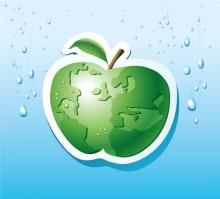
For World Food Day, here’s a roundup of recent Sojourners magazine articles about food, a subject with tendrils throughout our lives and world—from field to farmworker to plate to body!
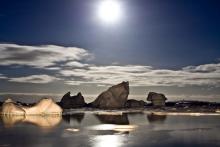
I’ll be traveling to New York tomorrow with a number of Christian colleagues. We’re having a rally — a Climate Action Prayer Rally! And you can join us!
I’m not sure about you, but I’m incredibly disappointed that our nation’s leaders – from all sectors, all parties, and all levels – continually neglect to take leadership on our climate and energy crisis.
There are many reasons that climate change should be a top election issue, but here are just a handful of the most important ones.
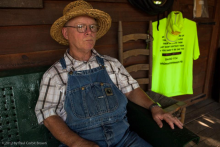
Larry Gibson, “Keeper of the Mountains,” died Sunday, Sept. 9 at his home on Kayford Mountain, W.V. He was 66. His wife and three adult children survive. Gibson had a fifth grade education, a career as a custodian at an Ohio automobile factory, and retired to the obscure and abandoned place of his birth. Gibson stood 5’2”.
“God chose the weak things of the world to shame the strong” (1 Corinthians 1:27b). From the halls of the nation’s most prestigious universities, through innumerable rallies, protests, and arrests, to the many hundreds of tours he hosted on Kayford, Gibson spoke truth to power with uncompromising integrity, unflagging determination, and heroic courage.
Larry Gibson returned to West Virginia in the 1990s, and to his shock, learned that a new method of coal extraction was literally blasting mountains apart to extract coal while shoving the vast remaining rubble into adjacent valleys burying small streams. Ecosystems were being severely, irrevocably degraded. Scarcely anyone knew about mountaintop removal back then, let alone cared.
New tracking software developed by Kevin Gurney, an ecologist at Arizona State University is intended to help cities across the country keep their word on climate. Many mayors have pledged to reduce their carbon footprint, but they have no objective way to measure progress. The software will allow them to identify and target areas of the city that are releasing the most carbon, in order to address the real problem areas.
The idea of a personal carbon footprint is not new, but software that can follow our dirty tailpipes down the street is certainly revolutionary. Could the uncomfortable feeling of being watched be the encouragement city residents need to change their habits?
"Gurney collects piles of information about a city's energy diet — from utilities, transportation departments and air-pollution monitors. When he analyzed Indianapolis, Gurney and colleagues from Purdue University and other institutions could pinpoint emissions down to the level of a building or a street."
It’s been a good week for getting real. After Tuesday’s revelation that the majority of Americans link increased natural disasters with climate change, a new report yesterday indicates that they may be right.
In their newly-published report, reinsurance company Munich Re claimed that global climate change has been driving natural disasters and extreme weather events, and that this trend will increase as the climate continues to change.

As an antidote to all the stories of killing by drone, I’ve been collecting stories of the good things unpiloted aircraft can potentially do, or are already doing. Many are tasks now being carried out by piloted airplanes and helicopters, but drones bring advantages. They can fly higher, can stay in the air longer, and can fly in more dangerous terrain or situations with no risk to pilots.
Here are 10 things.
1. Monitoring crop watering. “A researcher from Ohio State University envisions the day — less than a decade from now — when a farmer waters the crops then launches an unmanned aerial vehicle to monitor precisely where the water went.” (Dayton Daily News)
2. Acting as lifeguards for beaches. “Surf Life Saving Australia says unmanned aerial drones will patrol some Queensland beaches this summer. … the drones, which have a wingspan of one metre, use cameras to search for swimmers in distress. … the drones will be fitted with flotation buoys that can be dropped down to the ocean.” (Australian Broadcasting Corporation)
3. Monitoring endangered species. “For the past few months, drones have been flying over the tropical forests of south-east Asia to map endangered species. A dozen of these unmanned aircraft, fitted with a video camera and an autopilot, have been deployed and will be joined by several more.” (Guardian)

In my last column, "Three Numbers that Predict the Future of the Planet", I wrote about the state of the climate crisis and focused on three key data points that reveal a bleak, though not altogether hopeless, reality for us and for the rest of the planet.
As promised, this column is forward-looking and moves from describing the problem to prescribing the solution. To this end, I continue to draw heavily from the wisdom of Bill McKibben, Jim Ball, and other climate prophets who understand the times and are faithfully fighting to get us on the right track.
The way forward is not easy, but it will be good in the long run. Essentially, we need to set and enforce a limit on all remaining global warming pollution on the national and international scale, which will, we hope, keep warming to within 2oC. This will include some sort of pricing mechanism so that polluters have to take responsibility for paying for the costs of their own pollution. The problem is that we have not yet been able to muster the socio-political momentum necessary to reach these binding agreements. Turns out the polluters (largely the fossil fuel industry) don’t want to have to clean up after themselves. They’re also willing to fight with billions of dollars in campaign contributions and lobbying money to keep the status quo.
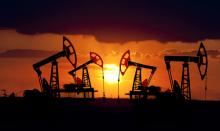
“LOTS OF COMPANIES do rotten things in the course of their business—pay terrible wages, make people work in sweatshops—and we pressure them to change those practices,” says veteran anti-corporate-abuse leader Naomi Klein. “But these numbers make clear that with the fossil-fuel industry, wrecking the planet is their business model. It’s what they do.”
The numbers she’s referring to are straightforward—they were first put forth in a report by a group of U.K. financial analysts a year ago, and they’ve now begun to seep into the debate about climate change. They show that if we have any hope of keeping the increase in global temperature below the 2 degree Celsius line (a goal so conservative that even the U.S. and Chinese governments have embraced it as their target), we can only emit 565 more gigatons of carbon dioxide. But the fossil-fuel industry, it turns out, has 2,795 gigatons worth of carbon in its inventory—that is, five times what it would take to run the Genesis creation story backwards.
In other words, this is not a case of “bad business practices.” It’s not like Apple paying bad wages or making workers use dangerous chemicals. Those are deplorable, and correctable—they’re what the boycott or the shareholder resolution was invented for. That’s how we’ve fought everything from grape growers to sweatshops.
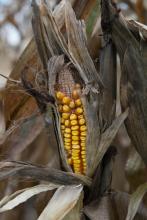
EVEN AS ELECTION-YEAR news cycles move on, the nation faces the aftermath of a prolonged and dramatic heat wave. July 2012 broke two records: It was the both the warmest July ever recorded and the warmest month—period—ever recorded in the lower 48 states. In our home of Chicago, temperatures crept past 100 five times. Moreover, the extreme drought of 2012 is not a random event, but part of a worrisome trend.
Global climate change has come to the heartland. Unless we take collective and decisive action, 102 could become the new 93. And it’s not just armpits and foreheads that will sweat. We have already glimpsed the future, and it is not pretty: massive forests burned in Colorado; major power outages; thousands of acres of crops lost to drought in Illinois, Indiana, Kansas, Missouri, Oklahoma, and elsewhere. These ominous events are indications of the “new normal” unless we make widespread changes in fossil-fuel consumption.
The farming crisis has been acutely severe—and it is directly related to climate change. This summer, the U.S. Department of Agriculture designated more than half of all U.S. counties as disaster areas (1,584 in 32 states). Fred Below, a crop biologist at the University of Illinois at Urbana-Champaign, bluntly summed up the reality: “It’s like farming in hell.”
Ironically, agriculture is the human activity that emits more greenhouse gases into the atmosphere than any other source, including transportation and industry. A key reason: Today’s agriculture intensively depends on burning fossil carbons. (Methane emission from cows and rice fields, and deforestation to clear farmland in the global South, are also contributors.) Being so dependent on fossil fuels means that the food sector is the greatest contributor to global climate change—and that rising oil costs increase food costs, squeezing the poor and marginalized.

The climate crisis is getting bad and we may be finally starting to notice. With increasingly crazy weather across America—scorching heat waves, massive fires, destructive derechos, devastating droughts—polls are starting to show a growing awareness of and concern for how our massive amounts of pollution are changing the weather and therefore changing our lives (mostly for the worse).
I know this is starting to sound alarmist and extreme. It should. Because reality is starting to get pretty desperate for those whose lives and livelihoods depend on a relatively stable and predictable climate. At the end of the day, that’s all of us. The first to get hit, however—and they are currently getting hit hard—are those who grow and raise our food (farmers, ranchers, fishermen, etc.), those who are economically and physically vulnerable (the elderly, sickly, homeless, etc.), and those who just happen to be in the wrong place at the wrong time (the victims of these storms and fires). And while we’re starting to feel the impact of climate change in the United States, our global neighbors in regions such as Africa have been the ones bearing the brunt of the suffering.
After decades of scientific studies and expert warnings, climate change is no longer something being debated; it is something being experienced. Let’s just hope we do what’s right to overcome this crisis before it is too late. Because “too late” may be coming a lot sooner than we realize, and “what’s right” may be a lot harder than we want to accept.
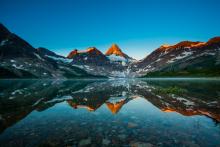
For most of my life, I have been a “Christian with conjunctions.”
So I’m a Christian BUT… I’m not like that street preacher who yells about hell and damnation on the downtown corner.
I’m a Christian BUT I’m different from the televangelist who raises his fist in the air and screams about salvation.
My own priest, the Rev. Thomas Murphy, first described himself as a Christian with conjunctions in a sermon the morning before our Episcopal congregation took to the streets during a festival in downtown Asheville, N.C. Across the street from a karaoke booth, we handed out cold water to festivalgoers and offered a simple ministry with no judgment or obligation.
For most of us, it was the first time we had prayed the Eucharist in public, with our colleagues, students, and neighbors walking past. The white banner above us proclaimed: “God loves you. No exceptions.”
I have realized that the ubiquitous street preacher has something to teach me: there is virtue in being bold about my faith. Through my research on congregations and climate change, this public witness to God’s love has become easier for me as my church life now reflects my deep value of God’s good earth.
The stakes of silence are high. If we don’t speak out and act on our moral mandate to reconcile with creation, we risk destroying God’s very creation.
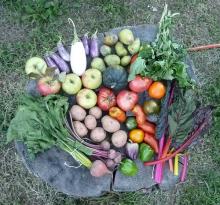
“Another world is not only possible, she is on her way. On a quiet day, I can hear her breathing.”
~ Arundhati Roy
Vegetables.
Who could have imagined an economy in which gentle vegetables were subversive?
But this is our world. A world where a vegetable, whose growth is imperceptible to the naked eye, can spider a crack into the concrete of our industrial food system.
We find ourselves in a food economy that sickens us. Health is divided along race and class lines: the food economy particularly sickens those whose wages do not allow them to buy the foods that can cure us of the diseases industrial “foods” cause.
Corporations, which do not speak the language of human love and health, wrangle to profit from the stream of ill Americans falling from the industrial foods conveyor belt. But we know that type 2 diabetes, heart disease, obesity, and some cancers are fully preventable by replacing part of what we eat with fruits and vegetables.
Why, in a wealthy, fertile country are we wrecking the environment to produce foods that kill us?
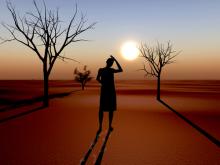
Because the scientific evidence surrounding climate change is clear, and the implications for humankind are many, the response to these global challenges needs to be persistent, organized, and significant. As Jesus calls upon humankind to “love thy neighbor," and as the Old Testament prophets remind us to strive for justice, we recognize that within a deeply connected world “neighbor” implies all that God has created, and injustice anywhere is injustice everywhere.
So an implication of Jesus’ words and actions is to share and receive the Good News not only on Sunday mornings, but through daily acts of long-term advocacy that promotes sustainable livelihoods. With COP18 in Qatar on the horizon, the time has come when humanity can no longer afford to fight over our resources, and the moment is upon us to prod our elected officials toward legally binding legislation that values the gifts of creation that God has entrusted us to manage.

The melting of sea ice during summer in the Arctic is part a natural cycle, but the rate at which the sea ice is currently melting is unprecedented, as illustrated in today’s BBC News.
"Norwegian researchers report that the sea ice is becoming significantly thinner and more vulnerable.
Last month, the annual thaw of the region's floating ice reached the lowest level since satellite monitoring began, more than 30 years ago.
It is thought the scale of the decline may even affect Europe's weather."

Hey, is this good news, or what?
Give up organic heirloom tomatoes at $4.99/pound!
Stop paying $5.99 up for a gallon of organic milk!
Buy cheaper ground beef than the organic grass-fed stuff at $7.99+/pound!
Slow down, folks. Read the articles, not just the attention-grabbing headlines. What the scientists discovered was basically this: Take two identical, ripe, juicy, fresh peaches, one of which was grown organically and one of which was not. Analyze the nutritional profile of each. You will find that one peach has just about the same vitamins as the other.
OK, and I'll bet they're pretty much the same color, too. And they probably weigh the same. And if dropped from a tall building, they most likely will go splat at about the same time.